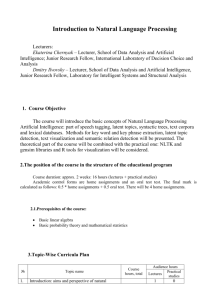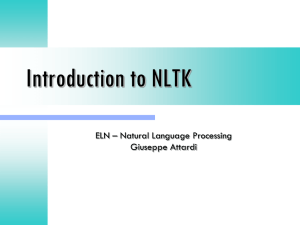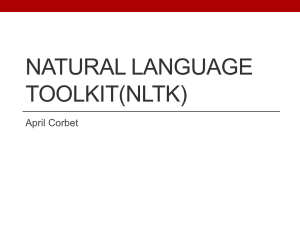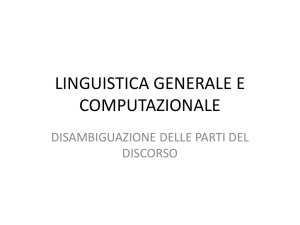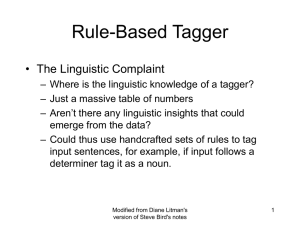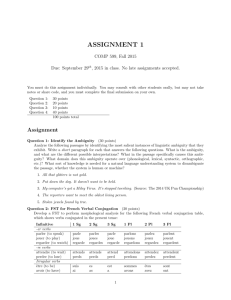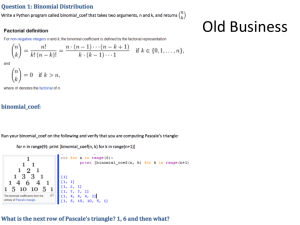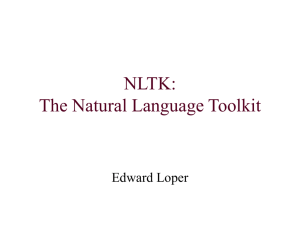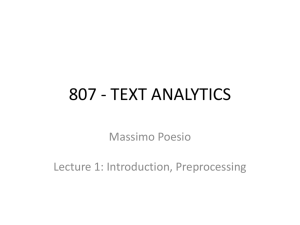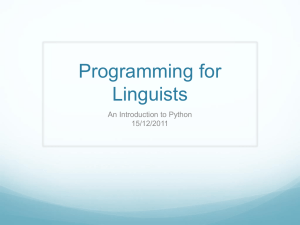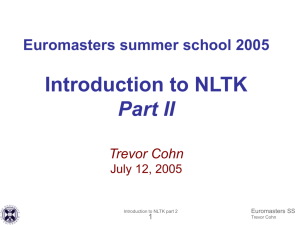ppt
advertisement
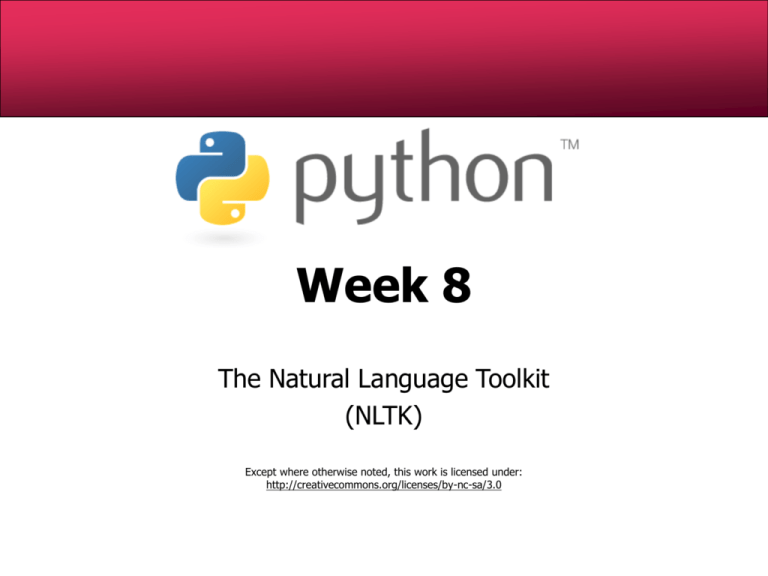
Week 8
The Natural Language Toolkit
(NLTK)
Except where otherwise noted, this work is licensed under:
http://creativecommons.org/licenses/by-nc-sa/3.0
List methods
• Getting information about a list
– list.index(item)
– list.count(item)
• These modify the list in-place, unlike str operations
– list.append(item)
– list.insert(index, item)
– list.remove(item)
– list.extend(list2)
• same as list += list2
– list.sort()
– list.reverse()
2
List exercise
• Write a script to print the most frequent token in a text file.
3
And now for something completely different
4
Programming tasks?
• So far, we've studied programming syntax and techniques
• What about tasks for programming?
– Homework
– Mathematics, statistics
(Sage)
– Biology
(Biopython)
– Animation
(Blender)
– Website development
(Django)
– Game development
(PyGame)
– Natural language processing
(NLTK)
5
Natural Language Processing (NLP)
• How can we make a computer understand language?
– Can a human write/talk to the computer?
• Or can the computer guess/predict the input?
– Can the computer talk back?
– Based on language rules, patterns, or statistics
• For now, statistics are more accurate and popular
6
Some areas of NLP
• shallow processing – the surface level
– tokenization
– part-of-speech tagging
– forms of words
• deep processing – the underlying structures of language
– word order (syntax)
– meaning
– translation
• natural language generation
7
The NLTK
• A collection of:
– Python functions and objects for accomplishing NLP tasks
– sample texts (corpora)
• Available at: http://nltk.sourceforge.net
– Requires Python 2.4 or higher
– Click 'Download' and follow instructions for your OS
8
Tokenization
• Say we want to know the words in Marty's vocabulary
– "You know what I hate? Anybody who drives an S.U.V. I'd really
like to find Mr. It-Costs-Me-100-Dollars-To-Gas-Up and kick him
square in the teeth. Booyah. Be like, I'm Marty Stepp, the best
ever. Booyah!"
• How do we split his speech into tokens?
9
Tokenization (cont.)
• How do we split his speech into tokens?
>>> martysSpeech.split()
['You', 'know', 'what', 'I', 'hate?', 'Anybody',
'who', 'drives', 'an', 'S.U.V.', "I'd", 'really',
'like', 'to', 'find', 'Mr.', 'It-Costs-Me-100Dollars-To-Gas-Up', 'and', 'kick', 'him',
'square', 'in', 'the', 'teeth.', 'Booyah.', 'Be',
'like,', "I'm", 'Marty', 'Stepp,', 'the', 'best',
'ever.', 'Booyah!']
• Now, how often does he use the word "booyah"?
>>> martysSpeech.split().count("booyah")
0
>>> # What the!
10
Tokenization (cont.)
• We could lowercase the speech
• We could write our own method to split on "." split on ",",
split on "-", etc.
• The NLTK already has several tokenizer options
• Try:
• nltk.tokenize.WordPunctTokenizer
– tokenizes on all punctuation
• nltk.tokenize.PunktWordTokenizer
– trained algorithm to statistically split on words
11
Part-of-speech (POS) tagging
• If you know a token's POS you know:
– is it the subject?
– is it the verb?
– is it introducing a grammatical structure?
– is it a proper name?
12
Part-of-speech (POS) tagging
• Exercise: most frequent proper noun in the Penn Treebank?
– Try:
• nltk.corpus.treebank
• Python's dir() to list attributes of an object
– Example:
>>> dir("hello world!")
[..., 'capitalize', 'center', 'count',
'decode', 'encode', 'endswith', 'expandtabs',
'find', 'index', 'isalnum', 'isalpha',
'isdigit', 'islower', 'isspace', 'istitle',
'isupper', 'join', 'ljust', 'lower', ...]
13
Tuples
• tagged_words() gives us a list of tuples
– tuple: the same thing as a list, but you can't change it
– in this case, the tuples are a (word, tag) pairs
>>> # Get the (word, tag) pair at list index 0
...
>>> pair = nltk.corpus.treebank.tagged_words()[0]
>>> pair
('Pierre', 'NNP')
>>> word = pair[0]
>>> tag = pair[1]
>>> print word, tag
Pierre NNP
>>> word, tag = pair
# or unpack in 1 line!
>>> print word, tag
Pierre NNP
14
POS tagging (cont.)
• How do we tag plain sentences?
– A NLTK tagger needs a list of tagged sentences to train on
• We'll use nltk.corpus.treebank.tagged_sents()
– Then it is ready to tag any input!
(but how well?)
– Try these tagger objects:
• nltk.UnigramTagger(tagged_sentences)
• nltk.TrigramTagger(tagged_sentences)
– Call the tagger's tag(tokens) method
>>> tagger = nltk.UnigramTagger(tagged_sentences)
>>> result = tagger.tag(tokens)
>>> result
[('You', 'PRP'), ('know', 'VB'), ('what', 'WP'),
('I', 'PRP'), ('hate', None), ('?', '.'), ...]
15
POS tagging (cont.)
• Exercise: Mad Libs
– I have a passage I want filled with the right parts of speech
– Let's use random picks from our own data!
– This code will print it out:
print properNoun1, "has always been a", adjective1, \
singularNoun, "unlike the", adjective2, \
properNoun2, "who I", pastVerb, "as he was", \
ingVerb, "yesterday."
16
Eliza (NLG)
• Eliza simulates a Rogerian psychotherapist
• With while loops and tokenization, you can make a chat bot!
– Try:
• nltk.chat.eliza.eliza_chat()
17
Parsing
• Syntax is as important for a compiler as it is for natural
language
• Realizing the hidden structure of a sentence is useful for:
– translation
– meaning analysis
– relationship analysis
– a cool demo!
• Try:
– nltk.draw.rdparser.demo()
18
Conclusion
• NLTK: NLP made easy with Python
– Functions and objects for:
• tokenization, tagging, generation, parsing, ...
• and much more!
– Even armed with these tools, NLP has a lot of difficult problems!
• Also saw:
– List methods
– dir()
– Tuples
19
